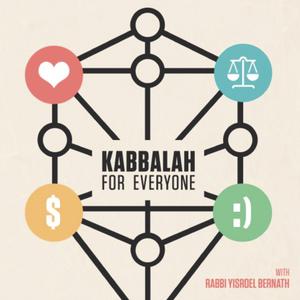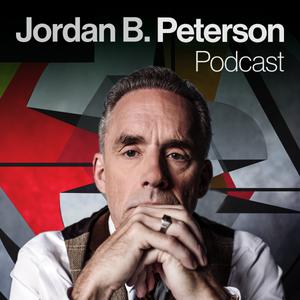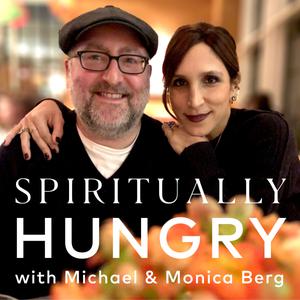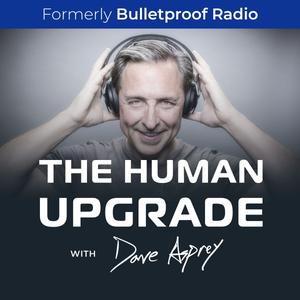
Kabbalah for Everyone
Rabbi Yisroel Bernath
You have probably heard about Kabbalah either as a Hollywood phenomenon or something that is beyond the world that we live in. Kabbalah actually has incredible secrets that can transform your daily life. This is your chance to connect to this incredible ancient wisdom and change your life for the better. Support this podcast: https://anchor.fm/kabbalahforeveryone/support
- 1 hour 20 minutesKabbalah for Everyone Lesson 13 | The Animal Soul
Got your own question for Rabbi Bernath? He can be reached at [email protected] or http://www.theloverabbi.com
Single? You can make a profile on www.JMontreal.com and Rabbi Bernath will help you find that special someone.
Donate and support Rabbi Bernath’s work http://www.jewishndg.com/donate
Follow Rabbi Bernath’s YouTube Channel https://www.youtube.com/user/ybernath
Access Rabbi Bernath's Articles on Relationships https://medium.com/@loverabbiGot your own question for Rabbi Bernath? He can be reached at [email protected] or http://www.theloverabbi.com
Single? You can make a profile on www.JMontreal.com and Rabbi Bernath will help you find that special someone.
Donate and support Rabbi Bernath’s work http://www.jewishndg.com/donate
Follow Rabbi Bernath’s YouTube Channel https://www.youtube.com/user/ybernath
Access Rabbi Bernath's Articles on Relationships https://medium.com/@loverabbi24 November 2024, 5:00 am - 17 minutes 5 secondsHoliness in the Ordinary: How Abraham's Hospitality Transformed the Spiritual | Rabbi Bernath's Sermon for Parshat Vayeira
This week's Torah portion, Vayeira, captures the surprising encounter between Abraham and three angelic visitors. Expecting divine revelations, the angels instead find Abraham busy with hospitality — preparing food, fetching water, and overseeing their comfort. They question, “Where is Sarah your wife?” seeking a glimpse of the true tzaddik, only to find that her holiness, too, is concealed within the humble details of life. Through Abraham's actions, the angels learn that genuine holiness is not in escaping earthly concerns, but in bringing light to them. Abraham demonstrates that true spirituality is about bringing heaven into the everyday, a mission passed down through his descendants.
Key Takeaways:
- Spiritual Greatness in the Mundane: Abraham’s greatness is revealed not in miraculous acts but in his devoted, everyday service to others, emphasizing that holiness is found within the ordinary moments.
- The Tzaddik’s Mission: Abraham’s role as a tzaddik teaches us that spiritual leaders embody selflessness, focusing on the needs of others as a path to divine connection.
- True Hospitality as Divine Work: By hosting the angels, Abraham exemplifies how simple acts of kindness can elevate humanity above even angelic beings.
- Bringing Heaven Down to Earth: The narrative illustrates that our purpose is not to transcend the physical but to infuse it with sacredness, creating a “home for G-d” here on earth.
- Holiness Concealed and Revealed: Abraham and Sarah’s roles demonstrate that true spiritual power may often be hidden, discovered in moments of kindness and commitment, rather than in overt displays of sanctity.
#Torah #TorahPortion #Bible #Abraham #Holiness #Spirituality #Judaism #Jewish #JewishHistory #BibleStudy
Got your own question for Rabbi Bernath? He can be reached at [email protected] or http://www.theloverabbi.com
Single? You can make a profile on www.JMontreal.com and Rabbi Bernath will help you find that special someone.
Donate and support Rabbi Bernath’s work http://www.jewishndg.com/donate
Follow Rabbi Bernath’s YouTube Channel https://www.youtube.com/user/ybernath
Access Rabbi Bernath's Articles on Relationships https://medium.com/@loverabbi14 November 2024, 8:00 pm - 1 hour 9 minutesKabbalah for Everyone Lesson 12 | The Rational Mind
Got your own question for Rabbi Bernath? He can be reached at [email protected] or http://www.theloverabbi.com
Single? You can make a profile on www.JMontreal.com and Rabbi Bernath will help you find that special someone.
Donate and support Rabbi Bernath’s work http://www.jewishndg.com/donate
Follow Rabbi Bernath’s YouTube Channel https://www.youtube.com/user/ybernath
Access Rabbi Bernath's Articles on Relationships https://medium.com/@loverabbiGot your own question for Rabbi Bernath? He can be reached at [email protected] or http://www.theloverabbi.com
Single? You can make a profile on www.JMontreal.com and Rabbi Bernath will help you find that special someone.
Donate and support Rabbi Bernath’s work http://www.jewishndg.com/donate
Follow Rabbi Bernath’s YouTube Channel https://www.youtube.com/user/ybernath
Access Rabbi Bernath's Articles on Relationships https://medium.com/@loverabbi10 November 2024, 5:00 am - 21 minutes 3 secondsAbraham, the Palace in Flames, and Judaism’s Call to Action
This week, Rabbi Bernath's sermon delves into the profound moment in this week's Torah portion when G-d calls Abraham to leave everything familiar and embark on a journey that would define not only his own life but the life of humanity. The Midrash’s metaphor of a palace in flames becomes the key image for Abraham's—and ultimately all of Judaism's—mission. Abraham's journey begins with a cry to G-d, asking why a beautiful world, brimming with order and wonder, is engulfed in suffering and strife. G-d’s response, “I am the ruler of the palace,” calls Abraham, and all of us, to act as His partners in repairing the world. Through G-d’s implicit challenge, Abraham learned—and taught—the lesson at the heart of Judaism: that we are tasked with extinguishing the flames of injustice and bringing G-d’s presence into our world.
Takeaways:
1. Humanity's Responsibility: Judaism teaches that we are responsible for the world, called upon to combat injustice and protect life, not simply to observe the beauty or lament the flames.
2. The Power of Moral Courage: True goodness demands moral courage, the bravery to condemn evil unequivocally and protect the innocent. Abraham’s journey ignites the mission of Judaism: to oppose wrongdoing without compromise.
3. Rejecting Passivity: The Midrash urges us to reject passivity in the face of evil. Like Abraham, we are called to ask tough questions of ourselves and society and to lead by example, striving toward a world of compassion and righteousness.
4. Redefining Leadership and Society: In choosing leaders and guiding our own lives, we must seek those who recognize the importance of standing up against those who “set fire to the palace,” those willing to uphold justice and moral clarity.
5. Partnership with G-d: The true beginning of the Jewish faith is the realization that we are G-d’s partners in creation, called to infuse holiness into the world by actively pursuing justice, kindness, and integrity.
#Judaism #Torah #Bible #LechLecha #TorahPortion #TorahLessons #Abraham #MoralResponsibility #TikkunOlam #Leadership #Avraham #chabad #DvarTorah #Sermon
Got your own question for Rabbi Bernath? He can be reached at [email protected] or http://www.theloverabbi.com
Single? You can make a profile on www.JMontreal.com and Rabbi Bernath will help you find that special someone.
Donate and support Rabbi Bernath’s work http://www.jewishndg.com/donate
Follow Rabbi Bernath’s YouTube Channel https://www.youtube.com/user/ybernath
Access Rabbi Bernath's Articles on Relationships https://medium.com/@loverabbi7 November 2024, 4:00 pm - 25 minutes 43 secondsThe Tower of Babel: Embracing Divine Diversity and Purpose
In the aftermath of the Great Flood, humanity united in the Valley of Shinar to construct the Tower of Babel—a symbol of ambition and defiance. The story reveals three driving philosophies behind the Tower: rebellion against G-d, forced homogeneity, and misguided rationalism. While one idea was burnt away, another buried but recurrent, the last still towers today in subtle denial of divine orchestration. The lesson is clear: humanity thrives through embracing diversity, acknowledging divine orchestration, and building not to rival heaven but to bring heaven down to earth.
Key Takeaways:
Rebellion Burned Away: The primitive notion of defeating the Divine was extinguished, symbolizing that even skepticism today acknowledges a transcendental Creator.
Unity vs. Diversity: Forced homogeneity, though submerged, resurfaces throughout history, proving true unity respects and celebrates diversity.
Misguided Rationalism Stands Tall: The persistent belief in randomness over divine providence endures, dulling moral sensitivity and feeding human hubris.
The Power of Choice: Life's significance pivots on our choices—to see the world as a series of random events or as an intentional, divine masterpiece.
#Bible #Torah #Jewish #Judaism #TowerofBabel #JewishHistory #Sermon #Unity #diversity #DivineUnity #divinepurpose #Faith #science #scienceandfaithGot your own question for Rabbi Bernath? He can be reached at [email protected] or http://www.theloverabbi.com
Single? You can make a profile on www.JMontreal.com and Rabbi Bernath will help you find that special someone.
Donate and support Rabbi Bernath’s work http://www.jewishndg.com/donate
Follow Rabbi Bernath’s YouTube Channel https://www.youtube.com/user/ybernath
Access Rabbi Bernath's Articles on Relationships https://medium.com/@loverabbi31 October 2024, 4:00 pm - 1 hour 17 minutesKabbalah for Everyone Lesson 11 | The Animal & Rational Drive
Got your own question for Rabbi Bernath? He can be reached at [email protected] or http://www.theloverabbi.com
Single? You can make a profile on www.JMontreal.com and Rabbi Bernath will help you find that special someone.
Donate and support Rabbi Bernath’s work http://www.jewishndg.com/donate
Follow Rabbi Bernath’s YouTube Channel https://www.youtube.com/user/ybernath
Access Rabbi Bernath's Articles on Relationships https://medium.com/@loverabbi27 October 2024, 4:00 am - 29 minutes 7 secondsThe Kabbalah of Sukkot | Four Types of Love
Got your own question for Rabbi Bernath? He can be reached at [email protected] or http://www.theloverabbi.com
Single? You can make a profile on www.JMontreal.com and Rabbi Bernath will help you find that special someone.
Donate and support Rabbi Bernath’s work http://www.jewishndg.com/donate
Follow Rabbi Bernath’s YouTube Channel https://www.youtube.com/user/ybernath
Access Rabbi Bernath's Articles on Relationships https://medium.com/@loverabbi14 October 2024, 4:00 am - 48 minutes 50 secondsRabbi Bernath's Five Strategies to Help You Forgive Anyone
Got your own question for Rabbi Bernath? He can be reached at [email protected] or http://www.theloverabbi.com
Single? You can make a profile on www.JMontreal.com and Rabbi Bernath will help you find that special someone.
Donate and support Rabbi Bernath’s work http://www.jewishndg.com/donate
Follow Rabbi Bernath’s YouTube Channel https://www.youtube.com/user/ybernath
Access Rabbi Bernath's Articles on Relationships https://medium.com/@loverabbi10 October 2024, 4:00 am - 28 minutes 9 secondsCoronation Night: The Essence of Rosh Hashanah | Rabbi Bernath's Thursday Kabbalah Morning Class
On the night of Rosh Hashanah, we engage in a cosmic ceremony unlike any other — the coronation of G-d as our King. Drawing inspiration from Rabbi Yosef Dov Soleveitchik’s childhood story in Chaslavitch, we explore the profound depth of Rosh Hashanah, where the humblest among us — the tailor, shoemaker, water-carrier, and painter — all participate in the crowning of G-d. But why does the infinite, omnipotent G-d desire our coronation? Through this act, we come to understand the relationship between human free will and divine sovereignty, and how Rosh Hashanah illuminates the purpose of our existence.
Key Takeaways:
Rosh Hashanah as Coronation: Rosh Hashanah is the "Coronation Night" when each person, regardless of their station, plays a role in crowning G-d as King.
Why G-d Needs Our Coronation: G-d desires a relationship built on choice, not coercion. We are invited to freely declare Him King, forging a personal bond with the Creator.
Human Free Will: Rosh Hashanah embodies the paradox of a limitless G-d who humbles Himself, allowing space for us to choose Him — elevating our smallness into cosmic significance.
The Power of the Simple Jew: It is not the scholars or kings alone who coronate G-d; it’s the everyday Jew, demonstrating that each of us holds a divine role and responsibility.
Our Unique Role: The vulnerability of G-d in desiring our choice speaks to the magnitude of human existence — we hold the power to invite G-d into our lives and crown Him King over creation.
#roshhashanah #roshhashana #judaism #god #freewill #divine #jewishcommunity #jewish #purpose #highholidays #sermon
Rosh Hashanah, Coronation Night, Rabbi Yosef Dov Soleveitchik, G-d as King, free will, divine sovereignty, relationship with G-d, Jewish existence, Chabad teachings, human purpose, vulnerability of G-d.
Join this channel to get access to perks:
https://www.youtube.com/channel/UCi5mua4-gkhiv7NdbJv_C7w/joinGot your own question for Rabbi Bernath? He can be reached at [email protected] or http://www.theloverabbi.com
Single? You can make a profile on www.JMontreal.com and Rabbi Bernath will help you find that special someone.
Donate and support Rabbi Bernath’s work http://www.jewishndg.com/donate
Follow Rabbi Bernath’s YouTube Channel https://www.youtube.com/user/ybernath
Access Rabbi Bernath's Articles on Relationships https://medium.com/@loverabbi26 September 2024, 3:00 pm - 1 hour 37 minutesKabbalah for Everyone Lesson 10 | Dirah Bitachtonim | Part Deux
Got your own question for Rabbi Bernath? He can be reached at [email protected] or http://www.theloverabbi.com
Single? You can make a profile on www.JMontreal.com and Rabbi Bernath will help you find that special someone.
Donate and support Rabbi Bernath’s work http://www.jewishndg.com/donate
Follow Rabbi Bernath’s YouTube Channel https://www.youtube.com/user/ybernath
Access Rabbi Bernath's Articles on Relationships https://medium.com/@loverabbi25 September 2024, 4:00 am - 26 minutes 4 secondsElul: The Divine Dance of Love and Unity | A Special Kabbalah Class
The month of Elul is a time of deep introspection and renewal in love and relationships, aligning with the theme of "Ani l'dodi v'dodi li" – "I am to my beloved, and my beloved is to me." This sermon explores the mystical dimensions of Elul, emphasizing how true love and unity are possible without compromising individuality. By understanding the Kabbalistic concepts of Divine light and vessels, we learn how love in human relationships mirrors the unity between the finite and the infinite. As we honor Jenna and Shmuel’s upcoming wedding, we delve into the profound lesson of how two distinct souls can join together seamlessly, embodying the essence of Elul’s energy.
Key Takeaways:
Elul's Unique Energy: Elul, the month of Virgo, carries the energy of love and relationships. It invites us to reflect on the mutual symbiosis between two individuals, just as it symbolizes our relationship with the Divine.
Ani L'dodi V'dodi Li: This phrase from Song of Songs encapsulates the essence of love—a dynamic where each person reflects the other. Love grows in proportion to the love we give, mirroring how we relate to the Divine.
Love as an Initiative: True love requires proactive effort. We must take the initiative in relationships rather than waiting for love to come to us. This active approach leads to deeper, reciprocated connections.
Unity Without Compromise: Kabbalah teaches that unity between distinct entities, like the union between a couple or between humanity and the Divine, is possible without losing individuality. The interplay of light and vessel shows how finite beings can merge with the infinite while maintaining their unique identity.
Reflection in Relationships: The union of "I" and "my beloved" reflects the cosmic unity, demonstrating how individual souls can unite harmoniously. This union is celebrated in marriage, where two people become one while still retaining their personal essence.Got your own question for Rabbi Bernath? He can be reached at [email protected] or http://www.theloverabbi.com
Single? You can make a profile on www.JMontreal.com and Rabbi Bernath will help you find that special someone.
Donate and support Rabbi Bernath’s work http://www.jewishndg.com/donate
Follow Rabbi Bernath’s YouTube Channel https://www.youtube.com/user/ybernath
Access Rabbi Bernath's Articles on Relationships https://medium.com/@loverabbi19 September 2024, 3:00 pm - More Episodes? Get the App
Your feedback is valuable to us. Should you encounter any bugs, glitches, lack of functionality or other problems, please email us on [email protected] or join Moon.FM Telegram Group where you can talk directly to the dev team who are happy to answer any queries.
 Live Kabbalah – Weekly Zohar Study
Live Kabbalah – Weekly Zohar Study
 The Jordan B. Peterson Podcast
The Jordan B. Peterson Podcast
 Weekly Energy Boost
Weekly Energy Boost
 Spiritually Hungry
Spiritually Hungry
 The Human Upgrade with Dave Asprey
The Human Upgrade with Dave Asprey